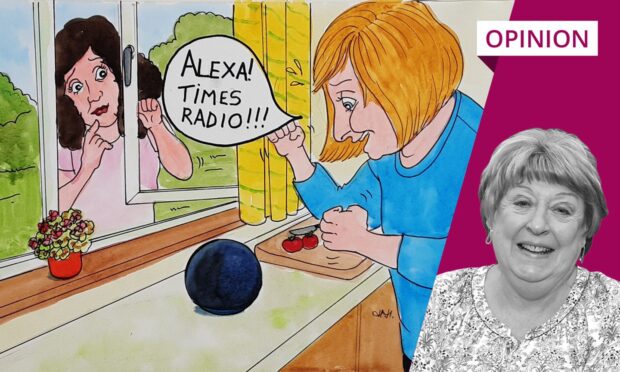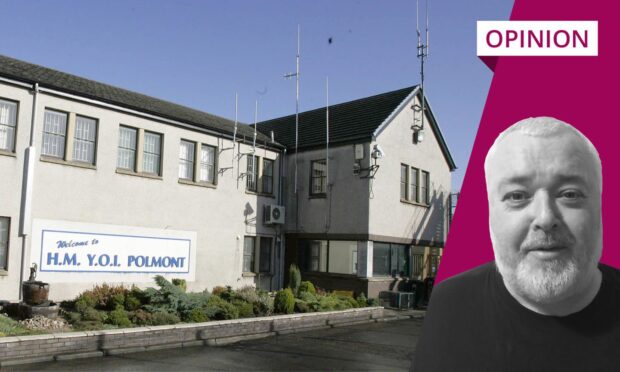For over 10 years, my husband Simon’s elderly mother, known by everyone as Gould, lived with us.
A former music teacher and a linguist who was fluent in several languages, she began to teach herself Gaelic, loved company, and soon developed new friendships.
At first, she was as fit as anyone in their late-80s can expect to be. But, over time, her health deteriorated. Despite increasingly restricted mobility, a number of stays in hospital and needing care 24 hours a day, she continued to enjoy life until just weeks before her death, aged 97.
On one occasion when I was with Gould while Simon was looking after our bookshop and restaurant, she said she thought she was being a burden on us, and we’d be better off without her. I reassured her that this was not the case, as I’m sure most people would have done in similar circumstances. However, there is always the possibility of a minority of people who would, if the law allowed, use this as an excuse to get rid of an elderly or disabled relative.
We would not have been able to keep Gould at home without the North and West Sutherland Care Alliance (NWSCA) providing us with carers, who came in every morning and evening, who provided cover so we would get a break, and who liaised with both us and social workers in designing the care package.
In 2012, the cash-strapped Highland Council reduced its funding for NWSCA by 58%, leading to the Care Alliance making the difficult decision to close.
It is in this context that I wish to discuss the Assisted Dying Bill currently before the Scottish parliament. I am aware that the provisions of the bill are so tightly drawn that assisted dying will only be allowed in the strictest of contexts, with it only applying to those diagnosed as terminally ill who can make decisions for themselves, and only after approval by two medical professionals. I also believe that those who are calling for a change in the law are doing so with the best of intentions. And, as someone with several chronic conditions, I know how debilitating pain can be. Nonetheless, I have concerns.
It hasn’t all been smooth sailing in other countries
No matter how strictly drawn the proposed law may be, its proposers and supporters cannot prevent future legislatures from extending it. It is possible that we would be on the road to euthanasia becoming an option for increasing numbers of people, perhaps even pressure being put on the elderly and disabled to accept their own death as the right thing to do.
It might be useful here to look at what has occurred in Canada, where Medical Assistance in Dying (Maid) legislation was introduced with safeguards in 2016 and restricted to those with terminal illnesses. Since then, the law in Canada has been further expanded to include those without terminal illnesses, and it is proposed that, in 2027, the law be extended to those with mental illness, some of whom may already have attempted suicide.
Since the introduction of Maid, there have been several reported instances of the inappropriate offer of assisted dying to disabled people. These include a Paralympian who, when she requested a stairlift in 2022, was offered assisted dying instead. The same offer was made to an army veteran with PTSD and a serious back injury, who was seeking medical treatment. In 2020, there was at least one instance where euthanasia was used as an alternative to Covid lockdown.
Assisted dying has been in place in the Netherlands since 2002, and there have been instances there where autism, learning disability and even loneliness and social isolation have been deemed acceptable reasons for seeking death.
Can’t we prioritise ‘assisted living’ over assisted dying?
Actor and disabled activist Liz Carr has long made clear her opposition to a change in the law, arguing that assisted dying would lead to further pressure on disabled people and those with chronic or terminal conditions. She calls instead for “assisted living”.
Before we consider changing the law, we should ensure that there are sufficient and fully funded resources for palliative care, home care, quality residential care, adaptations to allow people to live at home, and whatever else is needed to guarantee that we can be assisted to live our lives as fully as possible.
The legislation must make it as difficult as possible for it to be extended in the future, and it must not be seen as an alternative to palliative care
Much of this would come from local authorities, health boards and voluntary organisations, all of which currently face funding challenges.
If assisted dying does become law in Scotland, the legislation must make it as difficult as possible for it to be extended in the future, and it must not be seen as an alternative to palliative care. If, as many of us hope, the Scottish parliament rejects changing the law, we will still need to provide all the necessary resources to ensure that Liz Carr’s call for “assisted living” becomes a reality.
Kevin Crowe is a writer and former bookseller living in Wick, Caithness












Conversation